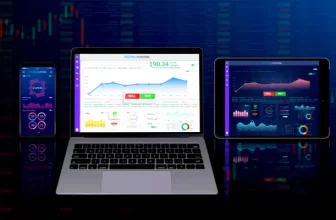
How to Make the Best of Your Demo Trading Account
Trading in the financial markets is a challenging yet rewarding experience. However, before committing real money to the market, it is essential to practice your skills and strategies. A demo trading account allows traders to simulate real market conditions without risking any capital. In this article, we will guide you on how to make the best of your demo trading account to prepare you for real-world trading.
Table of Contents
- Introduction
- What is a demo trading account?
- Advantages of demo trading account
- Disadvantages of demo trading account
- How to choose a demo trading account?
- Setting up a demo trading account
- Understanding market conditions
- Strategies to employ in a demo trading account
- Risk management in a demo trading account
- Common mistakes to avoid in a demo trading account
- Trading psychology in a demo trading account
- Transitioning from demo to live trading
- Conclusion
- FAQs
Introduction
Demo trading is a great way to practice trading strategies and familiarize oneself with the markets without risking any real money. However, many traders often fail to make the best use of their demo trading accounts. In this article, we will provide you with insights into how you can make the most of your demo trading account.
What is a demo trading account?
A demo trading account provides traders with the opportunity to practice trading strategies, test trading platforms, and familiarize themselves with market conditions before committing real capital to the market.
Advantages of demo trading account
- Risk-free trading: The most significant advantage of a demo trading account is that it provides traders with a risk-free trading environment and unlimited time to practice.
- Familiarity with trading platforms: Demo trading accounts allow traders to familiarize themselves with different trading platforms and their features.
- Understanding market conditions: Demo trading accounts provide traders with an opportunity to understand market conditions and their impact on different assets.
- Testing trading strategies: Demo trading accounts allow traders to test their trading strategies in a real market environment without risking any capital.
Disadvantages of demo trading account
- Lack of emotions: Trading in a demo trading account does not involve real money, which can result in traders not experiencing the same emotions they would while trading with real capital.
- Unrealistic market conditions: Demo trading accounts may not replicate the exact market conditions that traders would encounter while trading with real capital.
How to choose a demo trading account?
Choose a demo trading account that simulates the exact environment of the live trading account you want to trade. If you plan to trade currency, then do not demo on stocks.
Setting up a demo trading account
Setting up a demo trading account is usually a straightforward process. Many forex brokers provide a web version that does not require installation. You should try all platform options provided by the broker you decide to invest with. Once you decide which platform you will use, then spend enough time to practice on it.
Understanding market conditions
Market conditions refer to the prevailing economic, political, and social factors that affect the price movements of different assets. Understanding market conditions is critical to trading success as it allows traders to make informed trading decisions. Some of the key factors that impact market conditions include:
- Economic indicators: Economic indicators such as gross domestic product (GDP), inflation rates, jobless claim, crude oil reserves, etc.
- Geopolitical Events: Events such as elections, wars, demonstrations, social disturbance, new or changes in policies and regulations, etc.
- Natural disasters: this is the most complex of the three, because most natural disasters can not be predicted nor avoided, such as, earthquakes, floods, hurricanes, etc.
Strategies to test in a demo trading account
When trading in a demo trading account, traders should try various trading strategies to test their effectiveness in a real market environment. Some of the popular trading strategies that traders can try in a demo trading account include:
- Trend following: Trend following involves identifying the direction of the market trend and taking positions in that direction.
- Range trading: Range trading involves identifying key levels of support and resistance and taking positions when the asset is near these levels.
- Breakout trading: Breakout trading involves taking positions when the asset’s price breaks through key levels of support or resistance.
Risk management in a demo trading account
Risk management is crucial in trading, and traders should employ risk management strategies even when trading in a demo trading account so it becomes a second nature of your trading persona. Some of the popular risk management strategies that traders can employ in a demo trading account include:
- Setting stop-loss orders: Stop-loss orders allow traders to limit their losses in case the market moves against their position.
- Employing proper position sizing: Proper position sizing allows traders to limit their risk exposure and prevent significant losses. Do not know risk all your account in a single trade.
- Using trailing stop orders: Trailing stop orders allow traders to lock in profits while limiting their downside risk.
Common mistakes to avoid in a demo trading account
Traders should avoid common mistakes when trading in a demo trading account to make the best use of the account. Here are some of the common mistakes that traders should avoid:
- Not following a trading plan: Traders should have a well-defined trading plan and should stick to it when trading in a demo trading account. No trading plan make you an impulse trader. You should never trade based on impulse.
- Overtrading: More is not always better. This cannot be more true that in forex trading. If your strategy is many trades, such as scalping, then be it. Note that many forex brokers do not permit scalping.
Trading psychology in a demo trading account
Trading psychology refers to the emotional and mental state of traders when trading in the markets. Some of the tips for maintaining good trading psychology in a demo trading account include:
- Patience: Traders should be patient and avoid making impulsive trading decisions.
- Emotions: Traders should manage their emotions and avoid letting emotions cloud their trading decisions.
- Disciplined: Traders should stay disciplined and avoid deviating from their trading plan.
Transitioning from demo to live trading
When transitioning from a demo trading account to a live trading account, traders need to apply the trading plan practiced in the demo trading account, and to start with small trades to eliminate large losses. A trader needs time to manage the emotions associated with live trading and this could take some time.
Conclusion
In conclusion, demo trading accounts are an excellent way for traders to practice their trading strategies and familiarize themselves with the markets without risking any real capital. Traders should choose a regulated broker, employ proper risk management, and avoid common mistakes when using a demo trading account. By employing effective trading strategies and maintaining good trading psychology, traders can make the most of their demo trading accounts and prepare themselves for live trading.
FAQs for your demo trading account
- What is a demo trading account? It is a trading account that allows traders to simulate real market conditions using virtual funds.
- How long can I use a demo trading account? The duration of a demo trading account varies from broker to broker, but it is typically available for a limited time. However; you can always create more demo accounts, or ask the broker to extend the time period allowed.
- What are the advantages of using a demo trading account? The main advantage of a demo trading account is that it allows traders to practice in a risk-free environment.
- Do I have to pay money to use demo trading account? No. Absolutely not. If a forex broker asks you to pay to try the demo, dump them and choose another.






